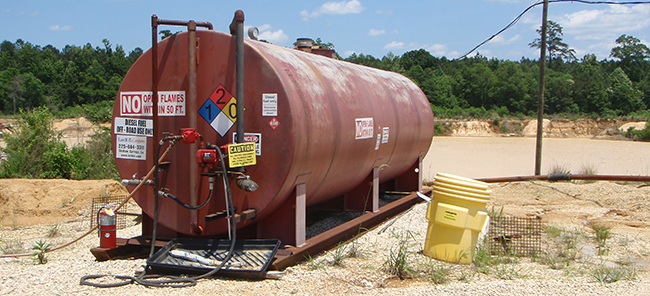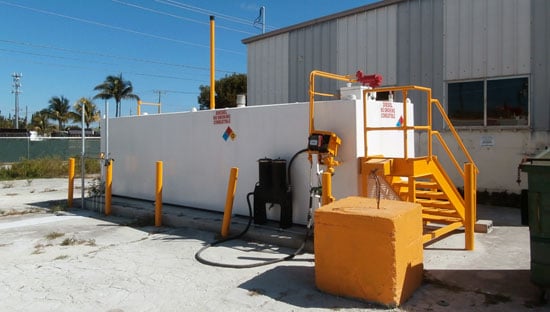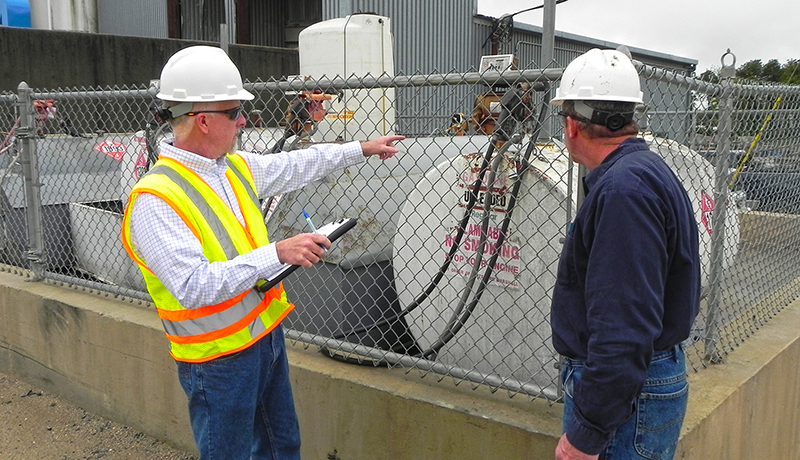When you need a Professional Engineer to certify an SPCC Plan, and when you don't.
When it comes to petroleum & oil product storage at industrial facilities, there's a nationally recognized plan that addresses management, safety, and environmental issues in one document. I'm referring to an SPCC Plan, or a Spill Prevention Control & Countermeasure Plan. In short, this plan helps you easily manage your facility in the event of a worst-case scenario, like a spill or leak, and provides a piece of "insurance" in case something bad happens. It's fairly cut-and-dry in terms of who needs an SPCC Plan, hopefully, readable and simple to use, and in certain cases, can even be prepared by you!
In other cases, it's more complex and may require your SPCC Plan to be certified by a Professional Engineer. If someone says do all SPCC Plans need to be PE certified, the correct answer, like so many things, is, it depends. So, let's discuss the reasons why you don't, and then do, need a PE to certify your SPCC Plan.
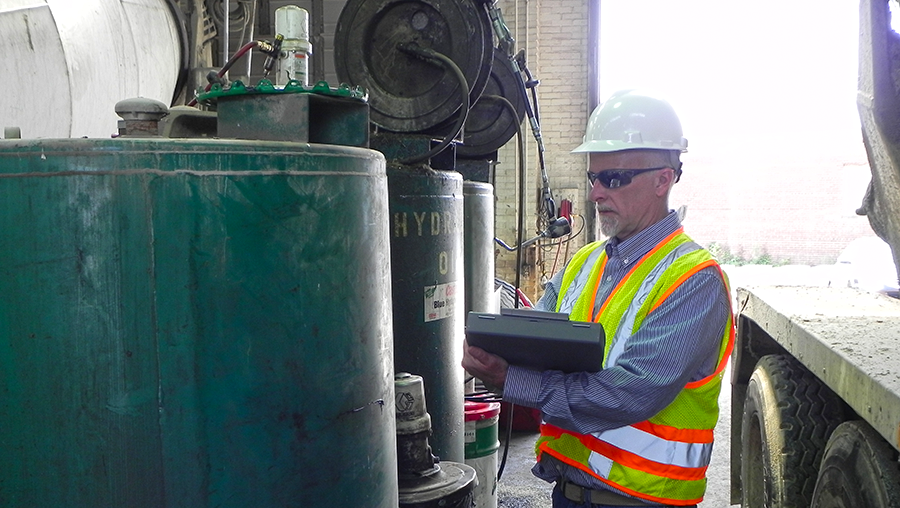
Useful SPCC Resources
Heads up! We're about to dive into a lot of information on SPCC plans. If you're still not totally sure what SPCC Plans are, or would like more information on SPCC Plans and regulations (and the requirements that come along with them!), you may want to check out some of these other helpful articles first.
Why you MAY need a Professional Engineer to certify your SPCC Plan.
Let's get something straight right away. There is a firm determination in Federal SPCC Regulations that says if a certain type of plan is needed, then your plan MUST be BE a Professional Engineer Certified SPCC Plan. In short, the criteria is:
- You have 10,000+ gallons of oil or petroleum on site. OR!
- You've had a spill or release of oil or petroleum in the last 3 years (there are some specifics here, such as quantity released, the period in which it was released, etc.). OR!
- You need to deviate from any SPCC Regulations.
Those three reasons are the reason you'll need a PE according to the USEPA's Qualified Facility page (which has specifics on everything we're talking about here).

Some Tier I & Tier II Self-Certified SPCC Plans don't need to be certified by a Professional Engineer.
In the case of a Tier I Self-Certified SPCC Plan or a Tier II Self-Certified SPCC Plan (meant for facilities with under 10,000-gallons of petroleum or oil on-site with some additional restrictions we'll outline in a second), they do not need to be certified by a Professional Engineer. Again, this is according to Federal requirements which say they can be 'self-certified'.
Meaning, the owner of a company, environmental manager, plant manager, an environmental consultant, etc., can 'certify the SPCC Plan for a facility, as long as you follow SPCC Regulations and develop a realistic, usable, applicable plan that adheres to those regulations (without deviations), follow through with requirements (like monthly inspections and annual SPCC training), you can self-certify your SPCC Plan.
The USEPA even went so far as to create a free SPCC Plan template that you can use. It's not bad, it's like trying to do your taxes on your own. For some, it's a walk in the park, for others, it's an insurmountable task.
Regardless, either way, according to Federal regulations, you don't need a Professional Engineer and may elect to self-certify your SPCC Plan.
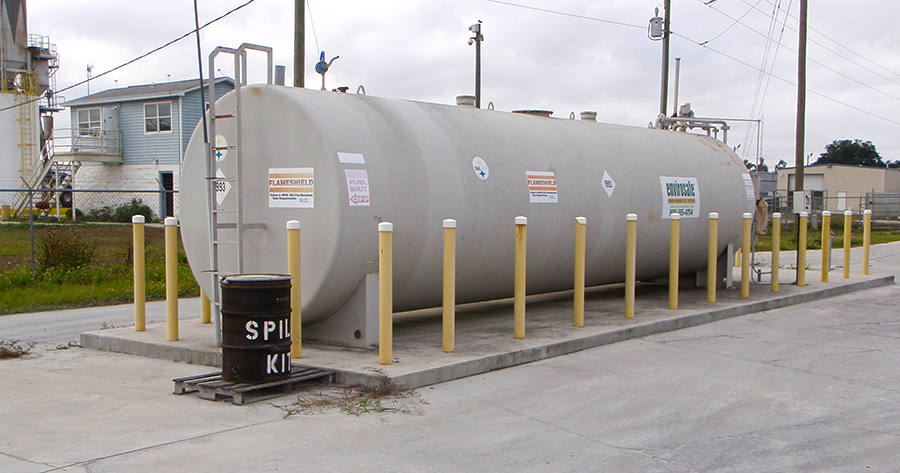
Sometimes you ALWAYS need a Professional Engineer.
If you review the links to the USEPA's website above, click around, and read for a bit, you'll notice that they say in several locations, in several ways, that some states don't allow self-certification. This is where a lot of smaller facilities turn to us and go "what?"
Several states out there say no matter what, SPCC Plans of any type need to be certified by a Professional Engineer. The word "states" is somewhat of a vague term, but in this instance, we're generally referring to either a state environmental agency or a state PE board. In some states, additional regulations similar to, but not the same, as SPCC Plans (usually called something different and state-specific, such as DPCC Plans in New Jersey) may place extremely similar requirements on you which would require using a PE to certify a plan. Often times when this occurs (at least from our experience) it's when a facility mergers an SPCC Plan with state requirements into something all-encompassing. In this instance, the state requirements may require a PE to get involved, but by deviating from SPCC Plan regulations (let's say you have to include ASTs of chemicals or raw materials within your plan), you would also require a PE to get involved. Again, from our experience, these types of situations usually already have a PE involved due to complexities relating to developing the plan, measuring containment, working on-site modifications, etc.
We've also seen state PE boards state that any SPCC Plan for a facility in that state must be certified by a PE. For example, on Kentucky's PE Board website, they address this very topic.
How can you find out? It's not easy. The USEPA maintains a list of state PE licensing boards online and contact information here. There's website and phone information on there, so reach out to your applicable state and find out. Or, reach out to us and we'll see if we can help you figure it out.
So I can't self-certify my SPCC Plan?
This is where things get fuzzy because two different government agencies may be saying different things and the lack of cross enforcement means one party might not necessarily reach out to the other if an issue arises. And, we've talked to both sides on this one. Various people within enforcement across the map at the EPA stated (on the phone) they only care that facilities are following the Federal rules and trying to do the right thing. Various PE boards we reached out to stated that if the SPCC Plan includes aspects of engineering then an engineer should get involved. Or they've flat out stated no, SPCC Plans must be certified by a PE, but in many cases couldn't point to where that determination comes from, such as a law, rule, regulation, or even just posted on a website. In response, enforcement at the USEPA stated to us this goes against the "spirit of the regulations and overburdens smaller facilities" (as one person described it) by requiring a PE to get involved all the time.
Here's a perfect example. We were actually involved in a project with a facility that was dealing with the USEPA at the time because of some other issues. That facility was in Kentucky, and someone from that company did self-certify their own SPCC Plan a few years before we were called to help with an unrelated problem. When the USEPA was on-site, they reviewed it and had no issue with it at all. They didn't reach out to the state's PE board to mention there was a self-certified plan, because again, they were happy there was an SPCC Plan in the first place, and the personnel on-site were actually following through with the requirements. We mentioned to the regulators about Kentucky's stance on self-certification, and they more or less said they're there to enforce things concerning Federal regulations, and if the state board has an issue with this self-certified plan they can send someone out on their own.
And here's where small facilities can get stuck between a rock and a hard place because you have pretty much three options.
- You can either complete a Tier I or Tier II Self-Certified SPCC Plan on your own and even use the USEPA's free template! As long as you follow SPCC Rules and regulations, you'll be fine (according to the USEPA). However, you do run the risk of getting in trouble with your state's PE board if they don't allow self-certification. We have seen a lot of operations with minimal oil storage go this route because what's the chance the PE board is going to find out you created this plan and come knocking? Honestly, we have no idea but have yet to hear about this happening to anyone. The USEPA's primary concern is that facilities are doing the right thing and getting into compliance with the Federal regulations as best they can.
- You can hire a PE to complete a Tier I or Tier II Self-Certified SPCC Plan. We hear from many smaller businesses that PE's are charging more than they're willing to pay, particularly considering the USEPA has a FREE Tier I SPCC Template online. Yes, not all PE's charge an arm and a leg, but still it's the point that the federal government says to use this free template which they deem acceptable, while the state licensing board says no you can't do that. Small businesses feel like they're getting the short end of the stick in this situation. This is what we recommend because there is the smallest amount of risk here and you're following all rules and regulations.
- You can do neither and risk getting in trouble from the USEPA and plan on explaining it down the road if and when you get inspected, or worst case scenario you have a spill or leak! Good luck with this, and we obviously do not recommend you take this option!

State PE Boards & Self-Certified SPCC Plans
So what can your state's licensing board do if they find out you prepared and self-certified a SPCC Plan in a state where self-certification is not allowed? Good question and we're not sure because we're not engineers! The USEPA doesn't have any firm guidance or answers on this either since they didn't give any aspect of enforcement of the Federal regulations to the licensing boards, so they don't know what they could do. From the PE's that we work alongside with, the answer generally is a board take action against a person or company who prepared the plan, but even they said that seemed unlikely unless there was a flagrant, serious issue.
From the people we've talked to at the USEPA, they've said off the record this clearly isn't the intent of the regulations at all. Self-certification is designed to allow smaller operations to get into compliance with SPCC Regulations without having overly burdensome costs or requirements that larger facilities or organizations would have. By removing that option, everyone, from the smallest mom-and-pop operation, to giant facilities with hundreds of thousands of gallons of petroleum products, are all viewed in the same light. Clearly, that's not fair to smaller businesses and facilities.
In my opinion, this is a classic example of the fox guarding the henhouse. When we reach out to PE boards (and we've reached out to dozens) to inquire about PE certification & SPCC Plans, the majority of them have no idea what we're talking about and usually respond with something along the lines of "we don't have anything to do with Federal environmental regulations" and want to know why are we even calling!? Once we explain things, ask around, talk to a few people, all of a sudden it's "oh yeah, well of course you can't do that yourself!" Conversely, some knew exactly what I was referring to and have stated self-certified SPCC Plans are not allowed at all, ever.
Hey, we get it. We know a lot of great engineers out there, and 100% understand that the board is there to protect professional engineers and the public, and we firmly stand behind that. But, this doesn't seem to be about safeguarding PEs or the public, or even about protecting the environment, which is the reason why SPCC Regulations exist in the first place (remember, this is an aspect of the Clean Water Act). This seems to create an unnecessary burden on the small facilities that might not be able to afford to hire a PE to prepare something as simple as Tier I SPCC Plan for meager oil-storage needs. But the rules are rules, so you have to do what is required of you.
What about using a PE certified in another state to certify an SPCC Plan?
We also routinely see this across various types of environmental regulations out there, and this really isn't shocking. Yes, some state's environmental departments will require that a PE is licensed in that state to sign off on projects or services that are occurring within that state. We find this fairly often when it comes to environmental regulations at the state level. But this isn't the case here, and we're talking about Federal requirements.
So, we have seen SPCC Plans for a facility in one state, certified by a PE in another state. Again, this is where things get tricky. The USEPA has said since this is a Federal requirement, and this requirement doesn't say anything about where a PE is licensed, they don't care if an out-of-state PE certifies an SPCC Plan. You can see for yourself here, on the USEPA's website.
But again, when asking a PE board, the answer is almost 100% consistent across the board that no, that person MUST be licensed in that particular state. Again, the Federal regulations say one thing, while states say another.
We get it, every state has unique requirements, from what constitutes a spill, to when you have to report a spill, to state-specific oil-storage considerations. The point being is that sometimes there are state-specific things that need to be addressed with regards to your SPCC Plan.

Use a Professional Engineer to certify your SPCC Plan if you want or need to.
If you're being ultra-conservative and absolutely want a PE to certify your Tier I or Tier II self-certified plan, go for it! There's no rule on the Federal level saying you can't use a PE for a plan that doesn't need one. And certainly, you still need a licensed professional engineer for a Full SPCC Plan (over 10,000-gallons), if you've had a spill in the last 3 years (again, there are some specifics around that), or if your plan deviates from standard SPCC Regulations. You also need a PE if your state says so.
State engineering boards might have something to say about when you do or don't need a PE for self-certified SPCC Plans, but in our years in the business, we've never heard of a licensing board giving anyone a hard time. We're not saying that can't, won't, or shouldn't, we're just saying we haven't seen it. That doesn't excuse you from doing something incorrectly!
At the end of the day, your best bet is to always follow the rules, regulations, and laws that impact your operation, no matter what, even if it means you need to spend money.
To learn more about SPCC Plans, and whether or not your facility might need a PE to certify your plan, click here to contact us or give us a shout at 888-RMA-0230 to click here to contact us online.





